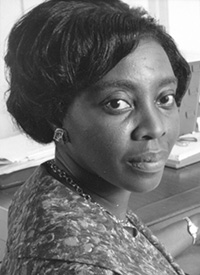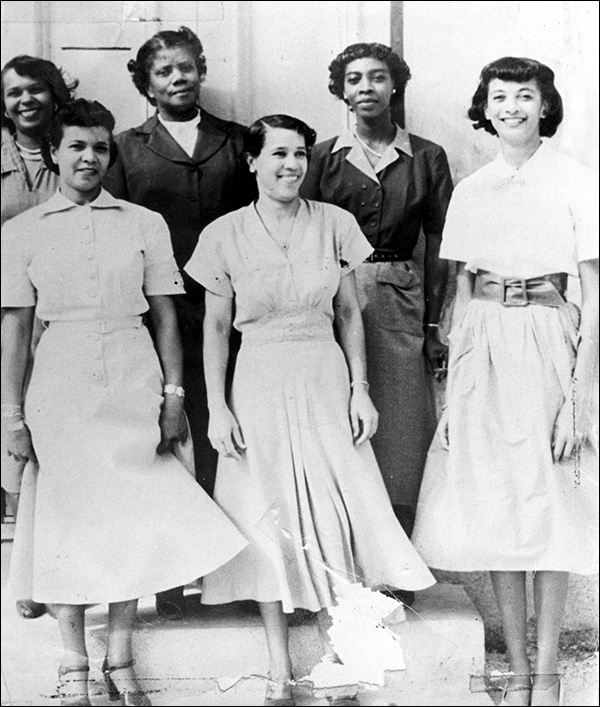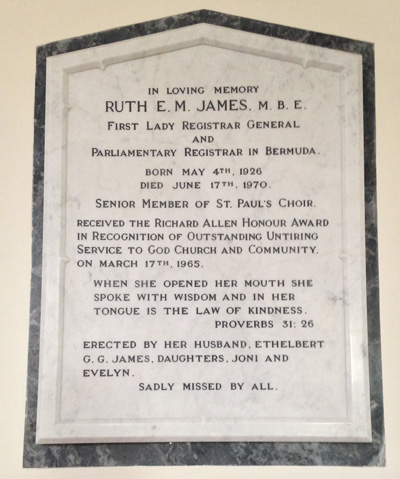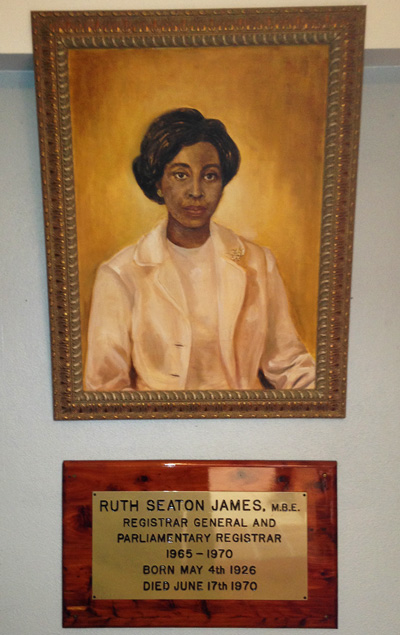- Biography
- Milestones
- Quotes
- Photos
- Learn More
Ruth Edith May Seaton James
May 4, 1926-June 17, 1970
Trailblazing civil servant |

Photo courtesy of Bermuda Archives.
|
Ruth Seaton James was the first woman and the first black person to head a Government department in Bermuda.
That milestone in the Island’s long march towards racial and gender equality occurred on August 22, 1966 with her appointment as Registrar General and Parliamentary Registrar. It came seven years after the 1959 Theatre Boycott ended legalised segregation in Bermuda.
Ranks
James had risen up through the ranks to head a department that had rejected her application for an entry-level position in 1950 because of her race. But one year later, she was offered a job, becoming the first black person to hold a clerical post within the Civil Service.
Her appointment as Registrar General and Parliamentary Registrar put her in charge of a newly created department. Previously the Registry General, which registers births, marriages and deaths, as well as trademarks, was attached to the Supreme Court.
As Parliamentary Registrar, James bore the awesome responsibility of registering voters for the forthcoming 1968 general election.
In April 1968, Governor Lord Martonmere described the election “as the most important general election in the history of Bermuda because for the first time it will be held on the basis of full universal suffrage and contested by three organised political parties".
Immigrants
James, who was described in one newspaper article as “most attractive woman, with a warm wide smile”, came from a family of high achievers.
She was the third of four children born to Dudley and Eva Seaton, both immigrants from St Kitts. The family home was on Smith Hill, off Parson’s Road, Pembroke.
Her mother worked as a maid while her father, a carpenter, was a political activist and “loyal supporter” of Dr. E. F. Gordon, according to UK-based Wyonne Paine, who in 2013 was the sole surviving Seaton sibling. (Wyonne Paine died in the UK, where she had lived since 1954, on April 12, 2020 at the age of 97.) Dudley Seaton was a signatory to the landmark 1941 Bermuda Workers Association petition, which called for, among other things, the abolition of the property vote. (The property vote was phased out in 1963 and abolished in 1968.)
Education
Following in her footsteps of her brother Earle Edward Seaton, who would become a judge with a distinguished international career, James attended Central School and The Berkeley Institute. She was passed over for the Bermuda Technical Scholarship, which would have paid for university education, because Earle had been a recent recipient.
Upon graduating from Berkeley, she taught for a time at Sandys Secondary School.
In 1946, she was sent to the U.S. to attend secretarial school.
After completing her studies, she returned to Bermuda, but was unable to get a secretarial position because of her race. She worked as a bookkeeper at black-owned Quality Bakery, and then returned to the U.S. for additional studies.
In an interview with the Bermuda Sun five months before her history-making appointment, she said: “In 1950 my father wrote to tell me that the Civil Service was now open to everyone. I came back but there were still no jobs open to coloured people. I taught at Girls Institute of Arts and Crafts, then one day the Registrar-General, Mr. Parker, asked me if I was still interested in the Civil Service.” She joined the department in June 1951.
Secretary
She worked there for five years and then moved to New York, where she worked as an executive secretary.
On May 8, 1957, she married fellow Bermudian Ethelbert James, who was also living in New York, in a civil ceremony at the Registry General.
The couple remained in New York until 1959, when they moved back to Bermuda.
She rejoined the Registry General, was appointed Assistant Registrar General in 1962, moving into the top spot four years later. Her appointment was front-page news in The Royal Gazette and the Bermuda Recorder.
Election
Over the new two years, Bermuda prepared itself for all-important general election.
On April 29, 1968, Lord Martonmere prorogued Parliament and announced the election date — May 22.
His wide-ranging speech to Parliament touched on the new Constitution and the far-reaching consequences it would have on political life of the community.
He said because the number of constituencies had increased from 36 to 40, a complete registration of voters had taken place “to ensure that there should be no confusion or risk that any person eligible to register as a voter should be deprived of his right to vote".
And he added: “…and I should like at this point to commend the work of the Parliamentary Registrar Mrs. Ruth James. She has performed her duties with a quiet competence which augurs for the conduct of the general election, the arrangements for which are also under her supervision.”
Although Bermuda had been convulsed by riots in April, the election, which brought the United Bermuda Party to power, went off without a hitch. James, for her part, was awarded an MBE in the 1969 New Year’s Honours list.
Condolences
But sadly, by then she was battling breast cancer. In June 1970, Government announced that she would be retiring because of ill health. She died a week later.
In Parliament, John Sharpe expressed his condolences on behalf of the government. Sharpe — later Sir John — said James had filled the post with great distinction.
He also said: “I think the characteristic most in evidence in serving the public was her unfailing courtesy and obvious competence. “
Government leader Sir Henry Tucker and Opposition Leader Lois Browne-Evans led the dignitaries who attended her funeral at St. Paul AME Church.
James was survived by her husband and two daughters Joni and Evelyn, brother Earle Seaton, who flew from Tanzania, where he was based to attend her funeral, and elder sister Wyonne.
Brother Charles died tragically in 1951 at age 21 in a drowning accident. He was reported to have been the first black graduate of Toronto’s Ryerson Institute of Technology, where he had studied publishing and general printing.
Memorial
In February 1972, a memorial plaque was erected at St. Paul AME Church, where James had been a member of the senior choir.
In February 1973, she received a posthumous honour with the opening of Ruth Seaton James Auditorium in Devonshire.
Prior to her death, she had been appointed chairman of a new advisory board for Prospect Secondary School for Girls and Robert Crawford School, but had to withdraw when her health declined.
James had also taught at Girls Institute of Arts and Crafts, which was the forerunner of Prospect Secondary School for Girls.
The auditorium served both schools and also the wider community. While neither school exists today, Ruth Seaton James Auditorium for the Performing Arts, was rebuilt in the 1990s following the construction of CedarBridge Academy, and continues to serve the community and keep her legacy alive.

|
May 4, 1926 — Born in Pembroke, the third in a family of four.
1946-1948 — Attends secretarial school in the U.S., but is unable to find a position in her field on her return to Bermuda. Works as a bookkeeper for a black-owned bakery.
1948-1949 — Returns to the U.S for further secretarial studies.
1950 — Returns home after being told jobs are open to blacks in the Civil Service. Upon learning otherwise, she joins the staff of Girls Institute of Arts and Crafts as a teacher.
1951 — After an apparent change of heart by the Civil Service, she is offered a position and becomes the first black appointed to a clerical position.
1956 — Moves to New York where she is employed as an executive secretary
May 8, 1957 — Marries Ethelbert James in Bermuda and the couple set up home in New York.
1959 — The couple return to Bermuda and James rejoins her old department.
1962 — Appointed Assistant Registrar General
August 22, 1966 — Appointed Registrar General and Parliament Registrar
January and February, 1968 — Conducts an island-wide voter registration in advance of the upcoming election
April 1968 — Praised by Governor Lord Martonmere for her efficient preparation of the voters list
May 22, 1968 — Organises the general election—the first under the new Constitution.
January 1969 — Awarded an MBE in the New Year’s Honours List
June 1970 — Retires from the Civil Service because of ill health
June 17, 1970 — Dies of breast cancer
February 20, 1972 — Memorial plaque erected at St Paul AME Church.
February 15,1973 — Ruth Seaton James Auditorium opens in Prospect.
“In 1950 my father wrote to tell me that the Civil Service was now open to everyone. I came back again but there were still no jobs open to coloured people. I taught at Girls Institute of Arts and Crafts, then one day the Registrar-General, Mr. Parker, asked me if I was still interested in the Civil Service ... We are a happy department and everyone likes the work. We could do with a male actually to act as messenger.” — Bermuda Sun, April 2, 1966
“I feel very pleased about it all.” — The Royal Gazette, August 22, 1966. James’ response to her history-making appointment
"I guess it’s the old die-hard disposition of some men who say they do not wish to be told to do anything by a woman (and we do tell them what to do during a marriage ceremony). But when it all over we’ve had some complimentary things said.” — Bermuda Recorder, August 26, 1970. James speaking about the reaction she had encountered from some men at registry weddings.

Ruth Seaton James (pictured second from right, back row) taught at Girls Institute of Arts and Crafts prior
to joining the Civil Service in 1951. Others pictured are from left: Rebecca Fubler, Fredericka Butcher,
May Francis, Violet Lambert and Carol Hill.
Photo courtesy Carol D. Hill

Ruth Seaton James’ memorial plaque at St. Paul AME Church.

A portrait of Ruth Seaton James, by artist Georgine Hill, hangs at the
entrance to the auditorium that bears her name.

Further reading
“Miss Ruth Seaton Becomes Bride of Mr. E. C. James”, Bermuda Recorder, May 18, 1957
“Mrs. Ruth James—She May Make History”, Bermuda Sun, April 2, 1966.
“1st Coloured Head of Department”, 1st woman appointed, The Royal Gazette, August 22, 1966
“Mrs. R. James Scores a Double First—New Registrar is Coloured”, Bermuda Recorder, August 26, 1966
Report of Governor’s Speech to Parliament, The Royal Gazette, April 30, 1968
Obituary, The Royal Gazette, June 18,1970
Tributes: Bermuda Recorder, June 13, 1970; Bermuda Sun, June 20, 1970
“Many Attend Mrs. Ruth James’ Funeral”, The Royal Gazette, June 26, 1970
“Her Life was like a Diamond”, The Royal Gazette, February 16, 1973
|

